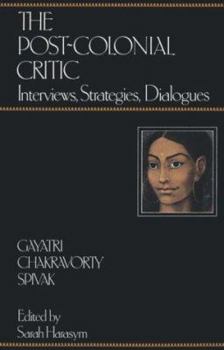The Post-Colonial Critic: Interviews, Strategies, Dialogues
Select Format
Select Condition 
Book Overview
Gayatri Spivak, one of our best known cultural and literary theorists, addresses a vast range of political questions with both pen and voice in this unique book. The Post-Colonial Critic brings together a selection of interviews and discussions in which she has taken part over the past five years; together they articulate some of the most compelling politico-theoretical issues of the present.
In these lively texts, students of Spivak's work will identify her unmistakeable voice as she speaks on questions of representation and self-representation, the politicization of deconstruction; the situations of post-colonial critics; pedagogical responsibility; and political strategies.
In these lively texts, students of Spivak's work will identify her unmistakeable voice as she speaks on questions of representation and self-representation, the politicization of deconstruction; the situations of post-colonial critics; pedagogical responsibility; and political strategies.
Format:Paperback
Language:English
ISBN:0415901707
ISBN13:9780415901703
Release Date:June 2014
Publisher:Routledge
Length:176 Pages
Weight:0.67 lbs.
Dimensions:0.5" x 6.0" x 9.0"
Age Range:18 years and up
Grade Range:Postsecondary
Customer Reviews
2 ratings
The Role of the Intellectual
Published by Thriftbooks.com User , 16 years ago
Having reluctantly read some of the crude reviews on this gem I could not pass adding my two cents. This is one of those books one must read constantly so as to remind oneself what it means to be an intellectual. Gayatri Chakravorty Spivak is never pretentious, eloquent beyond belief, nimble and erudite in her intimations of postcolonialism, feminism, postmodernism, multilingualism, politico-theoretical positionsings, materialism, and cultural criticism in general. However the most outstanding force of this collection of interviews, spanning five years in range, is the definition that surfaces on what it means to be an intellectual within an institutional establishment; Acknowledging that we all speak form a specific perspective, ideological assumption and subjectivity, Spivak articulates what is the pedagogical responsibility of an intellectual, and how and why. Spivak, most notably remembered for her redoubtable translation to Derrida's Grammatology is a tireless, humble cultural critic that believes intellectuals do have a place and a fearless call of responsibility. All the talk about postmodern ethics being a paradox and a paralysis of the philosopher's trade is here left standing with no credit whatsoever. Spivak never oversimplifies the theoretical presence and is always attentive to the deconstructive fallacy of being an edifying mouthpiece to the discourse that produces the intellectual milieu in the first place. Since the advent of postmodernism, with the mantra to "enjoy your symptoms", whenever a critic seems to indulge in a materialist reading of historical narratives, or adopt a political strategy wherein to extract such a context, s/he is charged with ideological bias, as if in denial of the relativism that academic freedom deliberates. Spivak is not Chomsky or Baudrillard. We find in her interlocutions, while responding to Elizabeth Grosz, Sarah Harasym, and Harold Veeser among others, a vocie that is aware of the pitfalls postmodernism posits, and the dangers a politico-theoretical renunciation announces. The space she works within is the domain where theory and practice collide. Her notions of representation, and the myriad structures of violence that we must "negotiate" within a given institution, and more affectedly within the academic realm, are timeless. She is like no other (save possibly the late Edward Said) able to expound such a tangled web while never pretending to have a voice that is universal. In fact she will argue that the claim to a neutral dialogue "denies history, denies structure, denies the positioning of subjects. One must learn to read how desire for neutrality, or desire for the Other articulates itself". Spivak shows us why being an intellectual is a responsibility that cannot be taken too lightly. Any pedagogue (as in a teacher) or writer, or socially engaged agent MUST read these interviews at least once a year. There is too much to learn from these. The fact that they are dialogues is of paramount imp
Excellent
Published by Thriftbooks.com User , 22 years ago
Amazing book! Very interesting and thought provoking.





